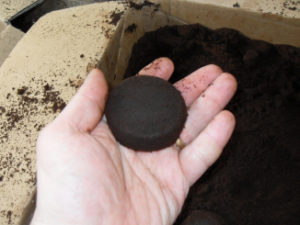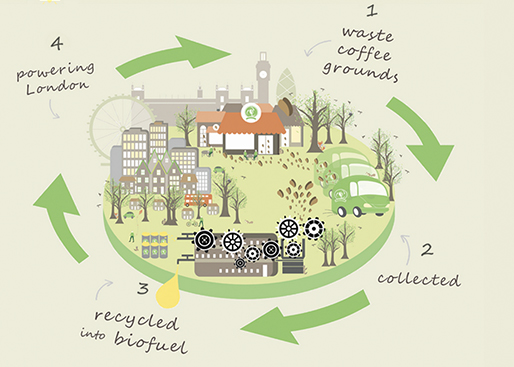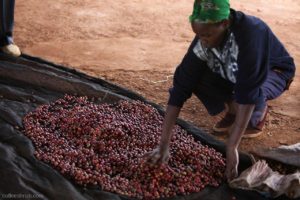Coffee and the Circular Economy
 With the growing number of coffee shops in the UK (and globally) there has also been a rise in associated waste products too: it is estimated that over 500,000 tonnes of coffee waste is produced in the UK every year, which not only leads to high disposal costs, but also millions of tonnes of CO2 and methane. However, there are some companies which are making efforts to shift the coffee industry to a more circular system with its waste than a linear one.
With the growing number of coffee shops in the UK (and globally) there has also been a rise in associated waste products too: it is estimated that over 500,000 tonnes of coffee waste is produced in the UK every year, which not only leads to high disposal costs, but also millions of tonnes of CO2 and methane. However, there are some companies which are making efforts to shift the coffee industry to a more circular system with its waste than a linear one.
“These black, sodden remains of pulverized coffee seeds have inspired the freshly caffeinated imaginations of scientists, entrepreneurs and social innovators form Melbourne to London to Seoul, sprouting into ideas of real consequence for the coffee industry” (Pike, 2016:93).

On a relatively small scale there have been efforts to find ways of using coffee grounds. There are businesses such as Grocycle, that have been built around using coffee grounds to grow mushrooms, and innovators who have created a coffee maker which uses spent coffee grounds to help grow mushrooms (Egerton-Read, 2016)*. There are even people who have found ways to turn coffee grounds into furniture. The designer, Adam Fairweather through his venture Re-Worked, has partnered with GreenCup who provide a supply of waste coffee grounds to develop materials from the grounds which can be used to make furniture, jewellery and even parts of coffee machines, such as the Sanremo Coffee machine (Moulds, 2015).
One of the perhaps more well known schemes for using coffee grounds is Ground to Ground founded by Shane Genziuk; established as a social enterprise it was designed to educate people about how they can use coffee grounds, partnering with coffee shops to allow customers to take the grounds, which reduces the amount that have to be disposed of (Pike, 2016). As part of the Ground for Ground programme, customers can collect coffee grounds for use in the compost heap, for example. Although it has been acknowledged that this was only ever going to involve a very small proportion of the coffee grounds produced. There may be over 1,000 cafes which work in partnership with Ground to Ground but it has been argued that although initiatives like Ground to Ground are important, they are insufficient, and what is needed is a much broader approach to shift from a linear economy to a circular one. (Pike, 20116: 98).

This was recognised by Costa Coffee, one of the largest coffee shop chains in the UK, who have participated in the Ground for Ground programme, but have sought to find a mechanism to deal with much larger volumes of waste, and have done so in a new partnership with the company Biobean (Cuff, 2016).
“I like the ideas that in the same way coffee fuels your body, coffee can fuel buildings and transport” Arthur Kay, founder of Bio-bean (Wired, 2015).
Bio-bean, a clean technology company a company which takes coffee grounds to produce carbon-netural biofuels ( Singhoff, 2015). The company is the first in the world to industrialise the process of turning coffee grounds into fuel. The fuel which can be used in fuel stoves, log burners or open fires will turn around 2,000 tonnes of coffee ground waste from over 800 UK Costa coffee stores (Cuff, 2016).
Costa Coffee has a target to recycle 80% of its waste by 2020 so as Oliver Rosevear, Costa’s energy and environment manager explains: “striking a deal with bio-bean, which takes waste coffee grounds and turns it into low-carbon fuel for home wood burners and industrial biomass boilers, seemed like a no-brainer. But more unusually for those familiar with the travails of environmental management, it also turned out to be relatively simple to put in place” (Cuff, 2016). Given that Costa was already collecting its coffee grounds to send to anaerobic digestion plant (a common method for disposing of coffee grounds) it meant the logistics for dealing with the coffee grounds was already in place. This method of using the coffee grounds is also cheaper than sending the grounds for incineration, making the more sustainable option of using Bio-bean a ‘no-brainer’, to use the word of the Bio-bean founder (Cuff, 2016).
 Bio-bean provides both a service and a product:
Bio-bean provides both a service and a product:
- the service: bio-bean partners with waste management companies to collect spent coffee grounds from local cafes and coffee producers enabling businesses to dispose of their waste responsibly and eliminate associated costs.
- the product: bio-bean sells biomass pellets and, in the near future, biomass briquettes, barbecue charcoal, biodiesel and biochemical” (Ellen Macarthur Foundation, 2015)
The coffee grounds are transported to a factory in Cambridgeshire which can deal with up to 50,000 tonnes of coffee grounds every year which represents around one tenth of coffee waste grounds in the UK (Pike, 2016). While the partnership with Costa Coffee represents one of the first with a large coffee shop chain Biobean have been involved in various other activities for example, in 2015 the company were involved in a scheme with First Mile to process waste coffee grounds collected from coffee shops in London (create enough power to heat 15,000 homes (Pike, 2016). Coffee shops would give the coffee grounds away as they would otherwise have to pay for disposal fees (Pike, 2016). They have also had partnerships with Network rail to collect coffee grounds from some its largest train stations including London’s Victoria and Waterloo to generate 650 tonnes biofuel (Edie, 2015).
Bio-bean aims to shift the coffee industry from a linear system to a circular one, recycling waste coffee grounds into renewable energy as part of an effort to implement cost-effective circular initiatives .You can find out more about the activities of bio-bean here:
These are just some examples of innovations in the coffee shop industry which are shifting practices towards a more circular economy than a linear one. Sustainability in the coffee shop industry is of vital importance, and increasingly recognised as such by the different stakeholders involved, from those involved in coffee farming to those who have to deal with coffee shop waste. As the number of coffee shops continues to rise globally it is likely that more large scale efforts to aid a shift towards a more circular economy will be needed, as well as the efforts taking place within individual businesses.

References:
- Cuff, M. (2016) Costa’s coffee grounds brew circular economy success. GreenBiz.
- Egerton-Read, S. (2016) These designers think that making coffee is the perfect time to grow mushrooms. Circulate 18/07/2016
- Ellen Macarthur Foundation (2015) Bio-bean Ltd. EllenMacarthur Foundation.
- Moulds, J. (2015) The UK company turning coffee waste into furniture. Guardian. 5/052016.
- Pike, D. (2016) What goes around…How Coffee waste is fuelling circular economy. Roast May/June. P.92-104
- Singhoff, F. (2014) Bio-bean recycle waste coffee grounds to create advanced biofuels. Wired. 19/22/2014.
- Volpicelli, G. (2015) This machine turns coffee waste into energy. Wired 27/11/15.
*In 2015 I tried the Grocycle coffee grounds pack to grow mushrooms. It worked really well and it was so easy to grow them. I would highly recommend giving these a try if you like to cook with mushrooms!



